- Home
- Blair Bancroft
A Season for Love Page 6
A Season for Love Read online
Page 6
Not that they didn’t care about her. Particularly Tony. But in the dire limbo into which she had fallen, love of family did not count. As far as the Duke of Longville was concerned, she was unwanted. Unloved. So unimportant in his life that he had not bothered to tell her where he was going. Or the specifics of why.
Family emergency, indeed!
For eight long days she had wavered between pride and practicality. Oh, foolish heart! More truthfully, she had wavered between total humiliation and abject, unreasoning love. In her starry-eyed youth she had married Gordon Wharton for love, and she had watched him die, two horrible lingering weeks after Badajoz. She had vowed never to lay herself open to such pain again. She would marry solely to have her own household, to ensure her daughter’s place in society. That her opportunity for a second marriage should come from a duke was mere gilding on the lily.
She would make him a good wife, she had been so certain.
As certain as she was that she was making a classic marriage of convenience. That she would not, could not, love a man who was so careless of her feelings.
So much for her foolish fantasies. The heart was a fickle organ, capricious, willful. Unkind. Cruel.
She would let him go, of course. No matter what papa, mama, and Tony might say, she would never hold Longville to his promise.
Never hold Marcus to his promise. Marcus. Jenny savored the name. Would she ever speak it aloud? It seemed highly doubtful. How could she have so little pride that she loved a man who had not even granted her the privilege of using his Christian name? A man who treated her like chattel? Surely she had mistaken her emotions. She loved the thought of having her own establishment again, a secure place in society for her daughter, the heady feeling of being a duchess. But as for the man who was laying all this in her lap, surely she had confused gratitude with love. Her anguish was for her potential loss of position, not for loss of the man.
Fool! And liar. She was a Norville and she would bear up, but for some quite ridiculous reason, Marcus, Duke of Longville, continued to hold a special place in her heart.
Jenny twisted her hands in her lap. And waited. It was less than an hour—but seemed forever—when Sayers, the Worley’s faithful butler, scratched on her door. “Lady Eugenia, the Duke of Longville is here.”
~ * ~
Chapter Six
The arctic expression on the face of the butler at Worley House provided the Duke of Longville with the first inkling of the reception he might expect from his betrothed. There had been a moment or two, as his cavalcade approached London, when he had belatedly realized his precipitate departure might have offended his almost-bride. The duke’s customary confidence had quickly reasserted itself, however, as he recalled his note assuring her he would return in time for the wedding. After all, he had chosen Lady Eugenia Wharton for her good sense. Surely she would not fly up into the boughs because he had not taken the time to explain what he himself was having difficulty comprehending.
But as Marcus followed Sayers to a small anteroom where he and Lady Eugenia might be private—after a suitable gratuity that had not lessened the butler’s disapproving stare one whit—it occurred to him that even though dukes never apologized, this might be the moment for him to develop this long-neglected art.
While waiting for his betrothed, the duke paced the fine Oriental carpet, ignoring its beautifully blended shades of burnt umber, burgundy, gold, and cream. He also failed to note the fine view of the Norville’s spring garden, easily visible through the floor-to-ceiling windows, and the finely carved overmantel of the creamy marble fireplace. He was, in fact, beginning to fear that his ducal heedlessness, his inborn arrogance, had created far more of a problem that he had anticipated.
When Lady Eugenia entered the room, he was certain of it.
His Juno, his Diana, might carry herself with pride, but her countenance was wan. He had planned to stride forward, take her hands in his, pour out the best apology he could, given that he had so little practice. Her look, her first words, stopped him where he stood.
“Longville. How kind of you to call.” Head high, Lady Eugenia swept across the room, the modest train of her mint green gown trailing gracefully behind her. After seating herself on a cream-and gold-striped satin settee, she waved him into a barrel-curved klismos chair nearby. Then she folded her hands in her lap, lifted her chin, and looked him straight in the eye. She waited.
Stunned by Lady Eugenia’s icy formality, the duke was, for the moment, silenced. Good God, he had not done anything that terrible. When she heard why—
A moment of clarity surfaced through the maelstrom of his thoughts. It was, he was forced to concede, quite possible his betrothed would have preferred a detailed explanation before his abrupt journey out of town.
“Lady Eugenia . . .” For the first time Marcus realized how stiff and formal was this term of address for a woman he was only days from marrying. “Eugenia,” he corrected.
“My family calls me Jen or Jenny.”
Yes, of course they did. He had heard Tony call her so a countless number of times. Again, he had been remiss. The duke nodded. “You will call me Marcus, of course.”
“I am not at all certain I can do that.”
Almost—still not quite believing the depth of the rift between them—he chided her for not instantly acquiescing to his desire. But was that not why he liked her? Lady Eugenia was no simpering miss, but a mature woman with a mind of her own. She was not going to forgive his excess of formality as easily as he had hoped. Why should she, when he was still treating her little better than a chance acquaintance?
“Eugen—Jenny,” you are quite right to be annoyed with me. I can only plead that when I heard the tale my daughter came to tell, my head was at sixes and sevens. I had little more sense than a mewling infant. I should have come to you and explained, but I was so anxious to be off to the Lake District, that I let all else slide from my head.” While searching for the right words, the duke fingered a gold button on his elaborately embroidered waistcoat. A peek from under his glowering dark brows gave him hope, for his betrothed’s face was less set into a marble mask than it had been a moment earlier. He had caught her interest.
“This is not easy to say . . . Jen,” he told her. “I realize my news may be cause for dismay. I can only hope, however, that you will rejoice with me.” His lady’s flickering spark of animation turned to wide-eyed speculation, her cold fury apparently swallowed up by curiosity. “Caroline came to tell me that after leaving London eight years ago, my wife bore a son. An heir. He is seven years old now . . . and called Laurence.” Anxiously, Marcus examined the face of his betrothed. “I swear it is true,” he added. “He is my image at that same age. And his birth is attested by the doctor and the local vicar.”
Years earlier, Jenny had been thrown from her horse onto the hard-packed Spanish plain, the air rushing out of her in a great whoosh that left her stunned and bleeding. The duke’s news was no less of a shock.
Longville wished to marry her to get an heir.
He now had an heir.
Ipso facto, he no longer had any need of Jenny Wharton.
“Jen!” The duke’s urgent voice was much too close for comfort. She discovered him beside her on the settee. Incredibly, his arms seemed to be about her shoulders. “Ah, Sayers,” the duke declared, as the butler answered his ring. “Some brandy for Lady Eugenia. She has suffered a shock.” The butler hastened off, but not before shooting the Duke of Longville a killing glance.
“I am quite all right,” Jen said, straightening her shoulders. Dratted man, he didn’t let go. His proximity was keeping her insides in turmoil, preventing her from displaying that her pride could be as stiff and arrogant as his.
When the brandy had been duly administered and the duke had come to the belated realization that he should return to the curved leather of the klismos chair, Lady Eugenia managed to don a semblance of her customary calm and collected façade. “You are entirely correct, Your Grace,�
� she informed her betrothed. “This is indeed joyous news. My felicitations. I assure you I understand perfectly. I will have papa send a notice to the newspapers immediately. To anyone who dares to ask, I shall simply say I decided we would not suit.”
“But you can’t!” Marcus roared. “Besides, I’m sure Worley will never stand for it,” he added righteously. “Is this all our marriage means to you, then? Are you so shallow that if you cannot provide the heir, you wish to cry off? Truly, Eugenia, I had thought better of you.”
Jenny stared. “You do not wish to cry off?”
“Are you mad? I’ve just become the father of two, why in the devil would I wish to cry off? If ever a man needed a wife . . .” The duke trailed off, glaring.
“Oh.” They stared, each close to the teeth-baring stance of two cats about to engage in a territorial dispute. “Forgive me,” Jen suddenly gasped, ducking her head. “I am usually more articulate.”
“As am I,” the duke groaned. “If you could but picture four days on the road with a seven-year-old with a tendency toward travel sickness . . .”
A giggle bubbled in Jenny’s throat, only to be ruthlessly repressed. Obviously, the Duke of Longville was not in a humorous mood. That he still wished to marry her was astonishing, even if his reasons were still all the wrong ones.
He needed a wife. And Jenny Norville Wharton did not need the scandal of a broken engagement or the friction of living forever in her mother’s establishment, which was all her current financial means would provide. Therefore, she was still in want of a husband.
Yet, had there been a niggling sense of relief somewhere inside her when she had been so sure he wished to cry off? Relief that she would not be trapped in a hopelessly one-sided marriage—loving a man who had never shared himself with another, not even, she suspected, with his first wife?
Perhaps. But the overwhelming surge of emotion she had experienced when she thought he wished to escape their betrothal was despair. The thought of losing him had yawned like the proverbial black pit before her. If he had not wanted her, she would have let him go. But since did want her—for whatever reasons—she would not let pride stand in the way.
For Susan’s sake. For her little girl.
Fool! For Jen’s sake. For Jen’s heart. For Jen’s eternal hope.
“Very well, Marcus,” she said to the man whose eyes had never wavered from her face. “I will marry you.”
In spite of the fact that the bride was a thirty-year-old widow with a child and the only dewy-eyed virgin in the wedding party was the daughter of the groom, the marriage of the Duke of Longville and Lady Eugenia Norville Wharton was expected to be one of the great events of the Season of 1815. Not even Napoleon’s escape from Elba or the massing of his former armies in France could compete for the ton’s attention. But no one had expected the wedding to be a riot, with what appeared to be half of London’s masses, as well as the elite not fortunate enough to be on Lady Worley’s invitation list, attempting to crowd into Hanover Square for a glimpse of the bridal party, and, most particularly, of the young Marquess of Huntley. Not that the few who were tall enough, or aggressive enough, to actually see something didn’t appreciate the arrogant set of the duke’s shoulders, the sheer beauty of his eldest child, the sturdy handsomeness of the Norville family, or the pale but statuesquely regal presence of the bride. But the lad . . . ah, the little lad caught everyone’s eye. Whether they thought him a miracle or an imposter, the remainder of the bridal party did not rate a second glance. How like his father! A bastard, that’s what he is. Duke’s a rare fool, if y’ask me! Not a bit of it—boy’s the very spit of ’im. Duchess played ’im false, I tell ye . . . got to be all a hum, it is. Ah, but what a handsome lad. Duke’s fair bustin’ with pride, can’t y’see?
There were more than a few glances, however, for the little girl lifted from the Worley family coach by the Viscount Frayne. When set upon her feet, she held her head high, walking with dainty steps toward the entrance to St. George’s, clutching her uncle’s hand, her dark hair, winsome face and dress of pink dimity making such a charming picture that the unruly crowd paused for a general sigh of approval. One voice rose above the others: “Praise be, the little one’s not a great gawk like her ma and grandma!” For a moment laughter rippled through the crowd, echoing hollowly in Anthony Norville’s ears. Furious, he hurried his four-year-old niece inside, hoping, probably in vain, that she was too young to understand.
Cruel, unfeeling bastards! What was being said about young Huntley was bad enough, but to mock little Susan’s mother and grandmother directly to the child’s face. Not that the ton wasn’t almost as bad, Tony had to concede. The buzz hanging over Mayfair was loud enough he was amazed people weren’t in fear of attack by a swarm of bees. Although he had been nearly as stunned by the news of an heir as his sister, Tony never doubted the child’s legitimacy. Lady Longville’s long-kept secret fit what he recalled of her eccentric personality. And Longville was one of the sharpest men Tony knew. The possibility of the duke being fooled by an imposter or a bastard was ludicrous. Nevertheless, there were many—including those the viscount had previously thought sober and sensible—who were far from ready to accept the Marquess of Huntley as the duke’s heir. It would appear that Longville’s solicitors had their work cut out for them. And the scandal was bound to rub off on Jen. Almost, he could have wished she had cried off.
Then he would not find himself uncle-by-marriage to Lady Caroline Carlington.
On the afternoon after the duke’s arrival in London, Tony had escorted his sister and niece to Longville House for tea. It had taken a bit of maneuvering to convince the irate Lord and Lady Worley that their daughter’s meeting with young Laurence was best done in as much privacy as possible. When told the full story of the duke’s journey to the Lake District, Quinton, Lord Worley, had raged at length. Mostly for show, Viscount Frayne later told his sister. “He’s so pleased Longville isn’t crying off, he’d swallow a dozen lost brats.”
Nonetheless, Lady Worley’s anger and pride were not so easily assuaged. She demanded to see the boy for herself. But Tony had finally talked her out of it. “Give Jen a chance,” he’d told his mother. “She has to do this by herself.” He offered his mama his best smile, and Malvinia Norville had sighed and given in. Her daughter and granddaughter would get a first look at London’s newest phenomenon without her guidance and support.
As their carriage traveled the short distance to Grosvenor Square, Tony kept telling himself he was doing his family duty, supporting his sister and, of course, satisfying a natural curiosity about this child being thrust upon the ton as heir to one of England’s premier dukedoms. But, truth to tell, his thoughts kept straying to a pair of wide-set amber eyes, hair the color of honey, and a face and figure God made to entice young men who had sworn they had no interest in marriage. Oh, yes, Anthony, Viscount Frayne, had leaped at the opportunity to escort his sister to Longville House.
Lady Caroline and her father awaited them in the drawing room, that young lady wearing what was probably her best gown, though a far cry from London’s latest fashion. The duke was his usual urbane self, although Tony thought he caught a hint of defensiveness lurking beneath the surface.
“I have sent for Laurence,” Longville announced. Then, making a sincere, though awkward, effort not to ignore little Susan, he turned to the child as soon as she was seated on a chair so much too large for her that her little legs stuck straight out in front of her. “You will like that, will you not, Susan?” he said. “Laurence is only three years older than you are. And on Saturday he will become your brother.”
“Susan . . .,” Lady Eugenia prodded.
“Yes, sir,” the little girl piped up, after darting a glance at her mother from the sky blue eyes which seemed to take up most of her piquant face. Another hiss from her mother. “Yes, Your Grace,” Susan Wharton corrected, peeking up at the duke in a look guaranteed to have young men falling at her feet in dozen years or so.
&nbs
p; The duke beamed at her, and Lady Caroline was reminded strongly of the father she had once known. She was beginning to realize that, as fathers went, Longville—Marcus—was superior to most.
“The Marquess of Huntley and Miss Sarah Tompkins,” the butler intoned, and every eye pivoted toward the door.
Miss Tompkins looked every inch the image of a superior governess. The streaks of gray in her once-dark hair matched the gray of her gown. She was of medium height, with the slightly thickened figure brought on by age. Although there was nothing pretentious about her, she nonetheless gave off an air of command. Miss Sarah Tompkins was a long-time employee, intelligent, aware of her own worth, certain of her place in the household. This, then, was the woman who had raised Lady Caroline. Tony felt an odd rush of relief. If the children of Amy, Duchess of Longville, had enjoyed any stability in their lives, Miss Tompkins had provided it. Perhaps it would not be as impossible to soften Lady Caroline’s dire opinion of society . . . and of marriage.
Lost in his personal thoughts, Tony was the last to look at the child Miss Tompkins had escorted to the drawing room. He became aware there was a great silence as everyone stared, unabashedly tongue-tied as they looked at Kenrick Laurence Carlington, Marquess of Huntley, a very large name for a very small boy. Good God, Tony thought, his eyes are nearly the same color as Susan’s. Not Longville’s at all, but the eyes of his wife, Amy. But in every other way the boy was the image of his father. Tall for his age, with dark curly hair, a determined set to his shoulders, a natural arrogance unexpected in a child raised in a thatched cottage as the son of the Widow Kennet in Little Stoughton. (Tony had gotten the entire tale from his sister as soon as the duke had revealed it.)

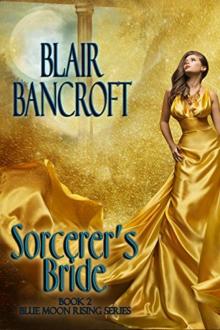 Sorcerer's Bride (Blue Moon Rising Book 2)
Sorcerer's Bride (Blue Moon Rising Book 2) Orange Blossoms & Mayhem (Fantascapes)
Orange Blossoms & Mayhem (Fantascapes) Royal Rebellion
Royal Rebellion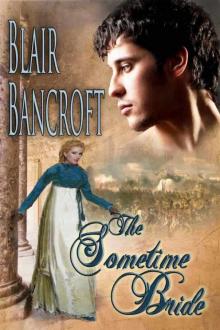 The Sometime Bride
The Sometime Bride A Season for Love
A Season for Love Death by Marriage
Death by Marriage Tarleton's Wife
Tarleton's Wife Limbo Man
Limbo Man Airborne - The Hanover Restoration
Airborne - The Hanover Restoration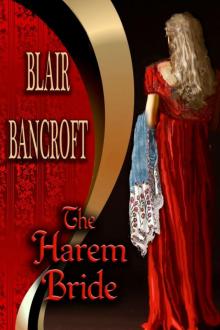 The Harem Bride
The Harem Bride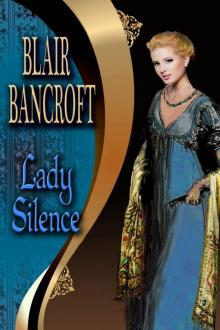 Lady Silence
Lady Silence Shadowed Paradise
Shadowed Paradise The Last Surprise
The Last Surprise Paradise Burning
Paradise Burning Florida Knight
Florida Knight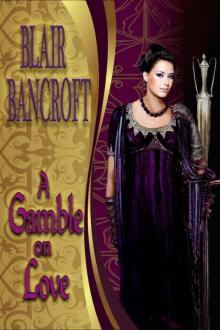 A Gamble on Love
A Gamble on Love The Bastard Prince (Blue Moon Rising Book 3)
The Bastard Prince (Blue Moon Rising Book 3)